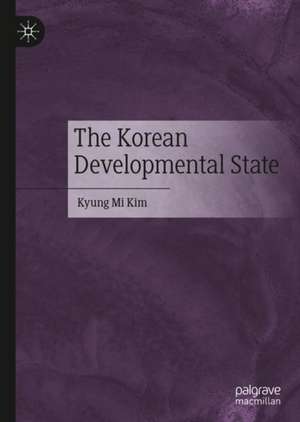The Korean Developmental State
Autor Kyung Mi Kimen Limba Engleză Hardback – 26 apr 2020
| Toate formatele și edițiile | Preț | Express |
|---|---|---|
| Paperback (1) | 723.69 lei 6-8 săpt. | |
| Springer Nature Singapore – 26 apr 2021 | 723.69 lei 6-8 săpt. | |
| Hardback (1) | 730.02 lei 6-8 săpt. | |
| Springer Nature Singapore – 26 apr 2020 | 730.02 lei 6-8 săpt. |
Preț: 730.02 lei
Preț vechi: 890.27 lei
-18% Nou
Puncte Express: 1095
Preț estimativ în valută:
139.69€ • 146.22$ • 116.27£
139.69€ • 146.22$ • 116.27£
Carte tipărită la comandă
Livrare economică 31 martie-14 aprilie
Preluare comenzi: 021 569.72.76
Specificații
ISBN-13: 9789811534645
ISBN-10: 9811534640
Pagini: 217
Ilustrații: XVIII, 254 p. 15 illus.
Dimensiuni: 148 x 210 mm
Greutate: 0.51 kg
Ediția:1st ed. 2020
Editura: Springer Nature Singapore
Colecția Palgrave Macmillan
Locul publicării:Singapore, Singapore
ISBN-10: 9811534640
Pagini: 217
Ilustrații: XVIII, 254 p. 15 illus.
Dimensiuni: 148 x 210 mm
Greutate: 0.51 kg
Ediția:1st ed. 2020
Editura: Springer Nature Singapore
Colecția Palgrave Macmillan
Locul publicării:Singapore, Singapore
Cuprins
1. Introduction.- 2. Current Debates and Theoretical Arguments.- 3. Characteristics of Korean Economic Growth.- 4. The Traditional Korean Political Economic Model.- 5. Change and Continuity of the Korean Developmental Model.- 6. Politics of Evolution.- 7. Conclusion.
Notă biografică
Kyung Mi Kim earned a Ph.D. at Seoul National University, South Korea, in 2017, and now works as a research professor in the Philosophy, Politics, and Economics Program at the same institution. She co-authored a journal article titled, "The State’s Role in Globalization: Korea’s Experience from a Comparative Perspective" published in Politics & Society in 2017.
Textul de pe ultima copertă
This book analyzes, from a historical comparative perspective, the Korean economic development model, the extent to which it has changed from its classical model, and what constitutes its changes and continuity. Unlike studies claims the dissolution of Korean developmentalism, the book holds that the Korean state maintains its characteristics of state-led capitalism despite significant changes in policies and instruments rather than converge toward an AngloSaxon-style free market system. It emphasizes that the continuity of state-led capitalism is compatible with institutional change. Some institutionalists insist that the continuity of Korean developmentalism is based on path dependency. In contrast, this book argues that Korean capitalism could sustain its state developmentalism by changes in policies and instruments to improve national industrial competitiveness in the changed context of international competition. This book will be of interest to East Asian scholars, comparative economists, and those curious about the future of the Korean peninsula.
Kyung Mi Kim earned a Ph.D. at Seoul National University, South Korea, in 2017, and now works as a research professor in the Philosophy, Politics, and Economics Program at the same institution. She co-authored a journal article titled, "The State’s Role in Globalization: Korea’s Experience from a Comparative Perspective" published in Politics & Society in 2017.
Caracteristici
Explores the nature of South Korean capitalism Seeks to explain the role of state and society in the development of the Korean economy Provides interesting insights for the road ahead for Korean unification
